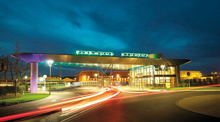Broadcast News
03/04/2013
Big Interview: Pinewood Studios (Part 2)

As well as physically expanding, Pinewood is also advancing in the field of digital post production. How is this being achieved?
Giles – In recognition of the fact that our clients are acquiring and making their content digitally, we have provided very effective infrastructure for them to do so at all of our company lots. That translates as secure, high-speed data connection between all of our stages and all of our facilities, effectively linking production to post production, as well as linking the two main areas that we serve.
The first is production services that are linked to our content being made here on our lots, and the second is distribution services, which allows for that content to be reworked into different languages, or formatted for onward distribution.
Darren – One of the things we have invested in quite heavily is what we call digital production services, which puts us in the position where we become the digital lab.
Whereas previously you would take your film, process and telecine it to produce video images which could then be worked with, we are now able to provide the digital version.
The equivalent process is 'debayering'. Most modern digital camera formats use chips which compress the images using a bayer compression. So we de-bayer and transcode, and then we make the files required for the process of editing. And then ultimately we maintain the hi-resolution files, back them all up and can produce them when required.
We are also getting involved in colour management. With digital acquisition we have the ability to do this on set, near set, in the lab and then maintain all those colour decisions throughout the post-production process.
This has really changed the way DOPs and directors are able to work. In some cases it can even be a challenge for them, because they can lack the experience and it can be quite time consuming. But for those who do embrace the technology, it allows them to experiment to a much greater extent than they would have previously been able to.
Giles – As a consequence of the digital acquisition process being relatively new, there are of course a number of competing technologies that often require unique and specialised workflows. But rather than try to serve only one or two particular ways of working, we have decided to be agnostic to all, so to speak, and I think that is something that is rather different about the way we approach things here.
All this digital information has to be stored, of course. Is archiving a big issue with regards to the digitisation process?
Giles – Archival covers a multitude of formats, in a multitude of different states and over a multitude of different ages. Archiving isn't just relevant to a film shooting today, but also to films that were shot fifty or sixty years ago. The challenge, in broad terms, is to allow the media to be accessible and commercially exploitable for years to come. I think the biggest challenge is in stability of the formats that are chosen to store media.
It's probably fair to say that the only media that we know a lot about, in terms of long-term storage, is film itself. There are actually investigations going on right know which are looking into whether film is actually the most appropriate format for long term storage.
Darren – When we look at storing data for current production and we look at data acquired within our archive and restoration department, in other words restoring and digitising old media, there are certain elements that are in common, and certain elements that aren’t. The biggest thing in common is managing the data. Right now we are using LTO 5, we've previously used LTO 4 and at some point in the future we will use LTO 6. One of the challenges is, once we create digital archive material on the data tape, we have to continue to migrate it up the format chain, as it were. Unlike film, these formats do become obsolete in relatively short periods of time. For example, we have restored nitrate film in the last year that is over a hundred years old, from the original negative on which it was acquired. If we then ask ourselves whether or not it is likely that we will be able to play back an LTO 5 tape in a hundred years, I think most of us know that it is very unlikely.
It might sound to some people like digitisation can be more trouble than it's worth...
Giles – There is an element of truth to that. Whereas it was probably true a few years ago that the big companies were desperate to digitise everything, irrespective of what it was, the real costs of digital storage and management have caused many clients to think a lot more carefully about what they choose to digitise and why.
I think the real driver is the perceived commercial value of the media itself. And that is a challenge which all of those content owners are wrestling with.
Darren – But regardless of the challenges, it is a very exciting time for the industry. The digital world offers enormous opportunities for us to streamline the process of film, TV and game-making production. This means the budgets available can be invested into the product that ends up on the screen, as opposed to back-room processing. And I find that very exciting.
Read the article in the online edition of Regional Film & Video here.
Giles – In recognition of the fact that our clients are acquiring and making their content digitally, we have provided very effective infrastructure for them to do so at all of our company lots. That translates as secure, high-speed data connection between all of our stages and all of our facilities, effectively linking production to post production, as well as linking the two main areas that we serve.
The first is production services that are linked to our content being made here on our lots, and the second is distribution services, which allows for that content to be reworked into different languages, or formatted for onward distribution.
Darren – One of the things we have invested in quite heavily is what we call digital production services, which puts us in the position where we become the digital lab.
Whereas previously you would take your film, process and telecine it to produce video images which could then be worked with, we are now able to provide the digital version.
The equivalent process is 'debayering'. Most modern digital camera formats use chips which compress the images using a bayer compression. So we de-bayer and transcode, and then we make the files required for the process of editing. And then ultimately we maintain the hi-resolution files, back them all up and can produce them when required.
We are also getting involved in colour management. With digital acquisition we have the ability to do this on set, near set, in the lab and then maintain all those colour decisions throughout the post-production process.
This has really changed the way DOPs and directors are able to work. In some cases it can even be a challenge for them, because they can lack the experience and it can be quite time consuming. But for those who do embrace the technology, it allows them to experiment to a much greater extent than they would have previously been able to.
Giles – As a consequence of the digital acquisition process being relatively new, there are of course a number of competing technologies that often require unique and specialised workflows. But rather than try to serve only one or two particular ways of working, we have decided to be agnostic to all, so to speak, and I think that is something that is rather different about the way we approach things here.
All this digital information has to be stored, of course. Is archiving a big issue with regards to the digitisation process?
Giles – Archival covers a multitude of formats, in a multitude of different states and over a multitude of different ages. Archiving isn't just relevant to a film shooting today, but also to films that were shot fifty or sixty years ago. The challenge, in broad terms, is to allow the media to be accessible and commercially exploitable for years to come. I think the biggest challenge is in stability of the formats that are chosen to store media.
It's probably fair to say that the only media that we know a lot about, in terms of long-term storage, is film itself. There are actually investigations going on right know which are looking into whether film is actually the most appropriate format for long term storage.
Darren – When we look at storing data for current production and we look at data acquired within our archive and restoration department, in other words restoring and digitising old media, there are certain elements that are in common, and certain elements that aren’t. The biggest thing in common is managing the data. Right now we are using LTO 5, we've previously used LTO 4 and at some point in the future we will use LTO 6. One of the challenges is, once we create digital archive material on the data tape, we have to continue to migrate it up the format chain, as it were. Unlike film, these formats do become obsolete in relatively short periods of time. For example, we have restored nitrate film in the last year that is over a hundred years old, from the original negative on which it was acquired. If we then ask ourselves whether or not it is likely that we will be able to play back an LTO 5 tape in a hundred years, I think most of us know that it is very unlikely.
It might sound to some people like digitisation can be more trouble than it's worth...
Giles – There is an element of truth to that. Whereas it was probably true a few years ago that the big companies were desperate to digitise everything, irrespective of what it was, the real costs of digital storage and management have caused many clients to think a lot more carefully about what they choose to digitise and why.
I think the real driver is the perceived commercial value of the media itself. And that is a challenge which all of those content owners are wrestling with.
Darren – But regardless of the challenges, it is a very exciting time for the industry. The digital world offers enormous opportunities for us to streamline the process of film, TV and game-making production. This means the budgets available can be invested into the product that ends up on the screen, as opposed to back-room processing. And I find that very exciting.
Read the article in the online edition of Regional Film & Video here.
Top Related Stories
Click here for the latest broadcast news stories.
18/02/2005
World's first digital cinematography feature film commences shooting
A unique feature film project, a co-production deal between companies in the UK and Lithuania, began principle photography late in December 2004, 'Sil
World's first digital cinematography feature film commences shooting
A unique feature film project, a co-production deal between companies in the UK and Lithuania, began principle photography late in December 2004, 'Sil
12/03/2015
Celebrating The Durability Of Film...
Cinelab London is one of the most comprehensive and accomplished film labs in the UK. Supporting clients who acquire or distribute on film, the compan
Celebrating The Durability Of Film...
Cinelab London is one of the most comprehensive and accomplished film labs in the UK. Supporting clients who acquire or distribute on film, the compan
17/08/2023
Palmer Digital Group Unveils New Line Of On-Wall Outdoor Digital Menu Boards
Palmer Digital Group has announced a new line of on-wall outdoor digital menu boards for the restaurant industry. The new series targets QSRs and fast
Palmer Digital Group Unveils New Line Of On-Wall Outdoor Digital Menu Boards
Palmer Digital Group has announced a new line of on-wall outdoor digital menu boards for the restaurant industry. The new series targets QSRs and fast
02/03/2005
QuVIS servers selected for groundbreaking 250-screen digital network
Following an extensive evaluation and competitive bid process, QuVIS servers will be installed by Arts Alliance Digital Cinema for the UK Film Council
QuVIS servers selected for groundbreaking 250-screen digital network
Following an extensive evaluation and competitive bid process, QuVIS servers will be installed by Arts Alliance Digital Cinema for the UK Film Council
10/06/2005
Channel 4 & Africa at the Pictures showcase African digital innovation
'Digital' and 'Africa' are, for those outside the continent, a potentially surprising pairing. Digital Africa will bring together dynamic, young film-
Channel 4 & Africa at the Pictures showcase African digital innovation
'Digital' and 'Africa' are, for those outside the continent, a potentially surprising pairing. Digital Africa will bring together dynamic, young film-
05/08/2005
Illumina Digital premiéres first full-length feature film At Edinburgh International Film Festival
The first full length feature film from Bafta award-winning multi-media production company Illumina Digital receives its UK premiére at the Edinburgh
Illumina Digital premiéres first full-length feature film At Edinburgh International Film Festival
The first full length feature film from Bafta award-winning multi-media production company Illumina Digital receives its UK premiére at the Edinburgh
28/07/2004
Film London’s digital film fund announces slate of new projects
Eight talented directors have been awarded a share of £68,000 of production funding and skills development with the London’s leading digital short fil
Film London’s digital film fund announces slate of new projects
Eight talented directors have been awarded a share of £68,000 of production funding and skills development with the London’s leading digital short fil
10/03/2003
Digital Film Lab restores World War I film
Digital Film Lab have completed the digital restoration on ‘Everybody’s Business’ - a 35mm First World War propaganda film for The Imperial War Museum
Digital Film Lab restores World War I film
Digital Film Lab have completed the digital restoration on ‘Everybody’s Business’ - a 35mm First World War propaganda film for The Imperial War Museum
02/07/2019
Visix Launches Digital Signage Done Right
Visix has launched Digital Signage Done Right, a weekly podcast focusing on how best to use digital signs for visual communications. The series target
Visix Launches Digital Signage Done Right
Visix has launched Digital Signage Done Right, a weekly podcast focusing on how best to use digital signs for visual communications. The series target
17/11/2009
Film Council 'To Steer Film Through Recession'
The UK Film Council has launched a three-month public consultation into the most significant revision of its activities since it was created in 2000.
Film Council 'To Steer Film Through Recession'
The UK Film Council has launched a three-month public consultation into the most significant revision of its activities since it was created in 2000.
11/06/2002
QuBit server used for Shanghai International Film Festival
QuVIS have once again travelled to China for the 6th Annual Shanghai International Film Festival. Two popular Hollywood releases, Warner Bros' 'Hearts
QuBit server used for Shanghai International Film Festival
QuVIS have once again travelled to China for the 6th Annual Shanghai International Film Festival. Two popular Hollywood releases, Warner Bros' 'Hearts
10/05/2007
UK Film Council Announce Funding And Policy Priorities
The UK Film Council published its new funding and policy priorities from April 2007 – March 2010. The document, Film in the Digital Age, includes the
UK Film Council Announce Funding And Policy Priorities
The UK Film Council published its new funding and policy priorities from April 2007 – March 2010. The document, Film in the Digital Age, includes the
23/05/2023
SFL Appoints Origiins Digital As Its Digital Partner
Origins Digital has been chosen by the Swiss Football League (SFL) as its digital partner for two projects aimed at advancing the SFL's online ecosyst
SFL Appoints Origiins Digital As Its Digital Partner
Origins Digital has been chosen by the Swiss Football League (SFL) as its digital partner for two projects aimed at advancing the SFL's online ecosyst
15/03/2007
Dolby Digital Cinema System Selected For US Beta Test and Kinepolis in Europe
Dolby Laboratories has announced that Technicolor Digital Cinema has ordered 190 Dolby Digital Cinema JPEG 2000 systems, and will deploy 60 units for
Dolby Digital Cinema System Selected For US Beta Test and Kinepolis in Europe
Dolby Laboratories has announced that Technicolor Digital Cinema has ordered 190 Dolby Digital Cinema JPEG 2000 systems, and will deploy 60 units for
07/01/2004
Research finds public ambivalent about digital television
More people would be willing to take up digital television if they were given the right information and the switchover were easy and cost-effective, a
Research finds public ambivalent about digital television
More people would be willing to take up digital television if they were given the right information and the switchover were easy and cost-effective, a















